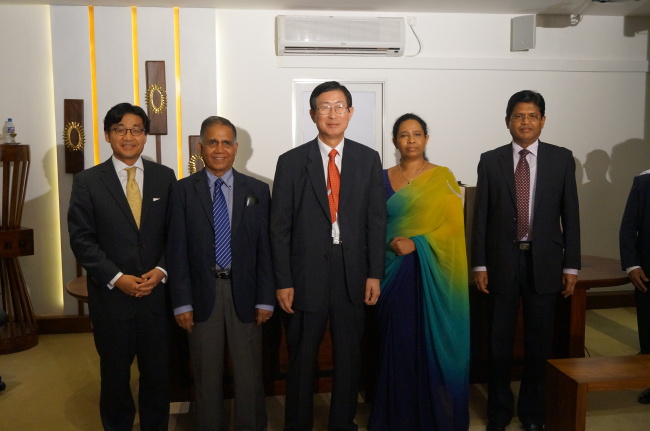KEPCO, Sri Lanka expand cooperation in power generation
By Seo Jee-yeonPublished : April 2, 2014 - 20:38
Korea Electric Power Corp., the nation’s sole power supplier, signed a letter of intent with Sri Lanka’s Ministry of Power and Energy in Colombo, the Sri Lankan capital, on April 1 to strengthen bilateral cooperation, KEPCO said Wednesday.
On the same day, the state-run company also signed a memorandum of understanding with the Ceylon Electricity Board under the Energy Ministry, which carries out government power projects, to develop projects in areas such as thermal power plants, renewables and power grids.
“Based on closer partnerships with the two governmental organizations in Sri Lanka, KEPCO expects to further contribute to Sri Lanka’s power market in the near future,” said KEPCO chief executive Cho Hwan-eik.
According to KEPCO, the thermal power market in Sri Lanka is a feasible area for a strong bilateral partnership.
“The government of Sri Lanka has a plan to double the facilities of thermal power generation over the next 10 years to offset the declining generation of hydroelectricity,” said Lee Seo-young, a spokesperson for KEPCO.
On the same day, the state-run company also signed a memorandum of understanding with the Ceylon Electricity Board under the Energy Ministry, which carries out government power projects, to develop projects in areas such as thermal power plants, renewables and power grids.
“Based on closer partnerships with the two governmental organizations in Sri Lanka, KEPCO expects to further contribute to Sri Lanka’s power market in the near future,” said KEPCO chief executive Cho Hwan-eik.
According to KEPCO, the thermal power market in Sri Lanka is a feasible area for a strong bilateral partnership.
“The government of Sri Lanka has a plan to double the facilities of thermal power generation over the next 10 years to offset the declining generation of hydroelectricity,” said Lee Seo-young, a spokesperson for KEPCO.

Sri Lanka currently depends equally on hydro and thermal power for its entire electricity demand. Recently, the country’s dependency on hydro power has fallen due to a continued drought.
Backed by its experiences in the Southeast Asian power market, KEPCO said it would have the upper hand when the government of Sri Lanka launched a thermal power project.
The state-run power supplier, which entered in the Philippines’ power market in 1995, now provides 12 percent of the country’s total installed power generation capacity.
In 2013, a KEPCO-led consortium won a 1,000-megawatt coal-fired thermal power plant building project in Nghi Son, the central province of Thanh Hoa, Vietnam, valued at 2.6 trillion won ($2.3 billion).
By Seo Jee-yeon (jyseo@heraldcorp.com)







![[Graphic News] More Koreans say they plan long-distance trips this year](http://res.heraldm.com/phpwas/restmb_idxmake.php?idx=644&simg=/content/image/2024/04/17/20240417050828_0.gif&u=)
![[KH Explains] Hyundai's full hybrid edge to pay off amid slow transition to pure EVs](http://res.heraldm.com/phpwas/restmb_idxmake.php?idx=644&simg=/content/image/2024/04/18/20240418050645_0.jpg&u=20240419100350)





![[From the Scene] Monks, Buddhists hail return of remains of Buddhas](http://res.heraldm.com/phpwas/restmb_idxmake.php?idx=652&simg=/content/image/2024/04/19/20240419050617_0.jpg&u=20240419175937)

![[KH Explains] Hyundai's full hybrid edge to pay off amid slow transition to pure EVs](http://res.heraldm.com/phpwas/restmb_idxmake.php?idx=652&simg=/content/image/2024/04/18/20240418050645_0.jpg&u=20240419100350)

![[Today’s K-pop] Illit drops debut single remix](http://res.heraldm.com/phpwas/restmb_idxmake.php?idx=642&simg=/content/image/2024/04/19/20240419050612_0.jpg&u=)